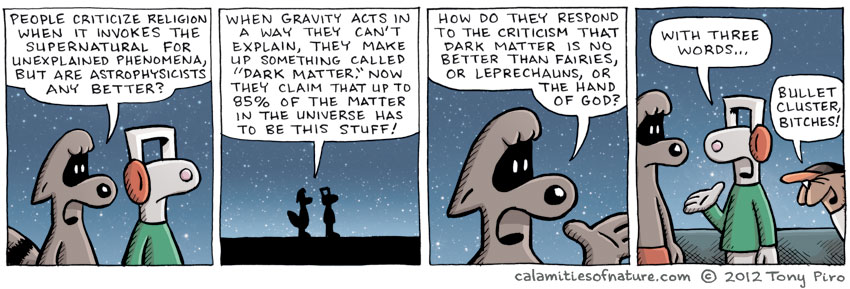
Attitude
You can lead a cosmologist to data, but you can't make him think.
 The general attitude of most scientists working in cosmology today
is that the Λ-Cold Dark Matter paradigm has been proven beyond
a reasonable doubt. This leads to the corollary attitude that any
problem encountered by ΛCDM (e.g., the cusp/core problem;
the missing satellite problem) is a detail that will inevitably
be explained away. A further corollary is that since ΛCDM
is clearly correct, alternatives like MOND must certainly be wrong,
and any problem they encounter (e.g., the
bullet cluster) is automatically
fatal. This attitude may ultimately prove to be correct, but it can
hardly be described as objective. One might just as well take the success
of MOND in fitting rotation curves as an indicator that it will inevitably
explain all other data in the universe. I doubt any cosmologist would
accept such an assertion any more than I do, so why should we accept that
ΛCDM must ultimately explain the observed MONDian phenomenology?
It hasn't yet, and it is far from obvious that it is can.
The general attitude of most scientists working in cosmology today
is that the Λ-Cold Dark Matter paradigm has been proven beyond
a reasonable doubt. This leads to the corollary attitude that any
problem encountered by ΛCDM (e.g., the cusp/core problem;
the missing satellite problem) is a detail that will inevitably
be explained away. A further corollary is that since ΛCDM
is clearly correct, alternatives like MOND must certainly be wrong,
and any problem they encounter (e.g., the
bullet cluster) is automatically
fatal. This attitude may ultimately prove to be correct, but it can
hardly be described as objective. One might just as well take the success
of MOND in fitting rotation curves as an indicator that it will inevitably
explain all other data in the universe. I doubt any cosmologist would
accept such an assertion any more than I do, so why should we accept that
ΛCDM must ultimately explain the observed MONDian phenomenology?
It hasn't yet, and it is far from obvious that it is can.
I understand very well the reluctance of cosmologists
to consider MOND seriously. This is the perspective from which
I started from myself. We understand cosmology well in the context of
Einstein's General Relativity, there is overwhelming evidence for dark
matter, and MOND itself seems just plain wacky at first glance. Why
invest the intellectual energy to learn so much new for something that
seems so unlikely to succeed?
To answer the last
question first, one can not come to a rational scientific conclusion
from a basis of ignorance. How much do you actually know about MOND?
The average professional cosmologist seems to know "It's wrong!" but that's
about it. And all that evidence for dark matter? Really, that should be
evidence for mass discrepancies. A lot of it is just as well
explained by MOND as by dark matter.
I started from the same intellectual place where most cosmologists
still reside. I only felt motivated and obligated
to learn about MOND when it succeeded in predicting the
dynamical
properties of low surface brightness galaxies where dark matter models
failed miserably (including my own). That is to say, it raised its ugly
head in my own research, so I felt I could no longer ignore it.
It takes a powerful, direct shock to inspire a rigorous level of
intellectual honesty. Unfortunately, most cosmologists have not
encountered this kind of shock in their own data, or if they have,
they've had the good sense to suppress it.
Intellectual honesty is not a term synonymous
with cosmological thought over most of human history. So the challenge
becomes:
Can we debate these issues objectively?
So far, the answer appears to be a firm
NO.

There are, unfortunately, many, many anecdotal examples to this effect.
Anyone familiar with the subject will be able to think of some;
here's one: the blog
Starts with a Bang.
Here it is asserted that MOND only addresses rotation curves (a common
misconception repeated so often that it has become a code phrase for
"La la la la la! Not listening! Don't know squat about MOND and don't
want to!") and "ignore[s] all of physical cosmology."
These are remarkably ignorant assertions that deny a large
amount of thoroughly refereed literature.
Uh, yeah, we have thought about cosmology.
Who was it that correctly predicted, a priori, the amplitude
of the second peak of the CMB? That'd be McGaugh 1999, ApJ, 523, L99.
Perhaps that was a fluke, perhaps not. But to pretend that it didn't happen,
to assert that there is no consideration of cosmology in MOND, is to be
either profoundly ignorant of the facts (perhaps the scientific awareness
of the author of this blog does not predate his own [2005] contributions
to the scientific literature) or worse, to be guilty of a Fox News style
of mendacity. Perhaps it is both, as this blog asserts that MOND cannot
explain a number of observations
that it has already been shown to explain
rather well.
The blog also overstates the case for ΛCDM
"predicting" the acoustic spectrum of the CMB. Not exactly. It fits
the CMB - post facto, not a priori. ΛCDM fits
the CMB very well. But then, the 6 fit parameters suffice to guarantee a
good fit to any physically plausible spectrum of acoustic oscillations.
So while the fit to the CMB is impressive, it isn't obviously more impressive
than the ~100 galaxies that have been fit by MOND with a single free parameter
each (M*/L). At least that experiment can be repeated. I would be more
impressed with the ΛCDM fit to the CMB if we hadn't had to make major
changes to the cosmological parameters in order to achieve it. But we did.
The only parameter that really matters to the amplitude of the second peak
is the baryon density Ωb. For decades this was the best
determined number in cosmology. Every one knew that
Ωbh2 = 0.0125.
Not 0.01 or 0.02. 0.0125. Had to be. Only it aint.
To fit the CMB, we have to take Ωbh2 = 0.0226.
i.e., the baryon density nearly doubled.
None of the
light elements suggested
a density Ωbh2 > 0.02 prior to the first
adequately resolved CMB observations. Since then, well, people seem to
be getting the "right" answer.
The blog goes on to assert that
considering MOND is tantamount to "insulting the entire field of physical
cosmology." How is it an insult to consider the possibility that what
we've been calling the dark matter problem is perhaps something even more
profound? We're always saying how wonderful it is that dark matter means
new physics. That's a good thing - science isn't dead. MOND means new physics.
But apparently that's a bad thing. Because we really wanted it to be new
particle physics, not new gravitational physics. Because that's how we roll.
This
blog post
is an insult to the scientific method.
It insults the principle of objectivity, whereby we should take seriously
theories that have a priori predictions that come true even
if we don't like those theories. It insults the principle of skepticism
to assume everything will work out with the many small scale problems of
ΛCDM simply because it works well on large scales. We've created
a Frankenstein's monster cosmology with more moving parts than the monster
had stitches. 75% of it is dark energy and 20% of it is dark matter. Stuff
we cannot see, cannot touch, and to date have zero laboratory evidence for.
Should we not be skeptical of that? The whole house of cards collapses if
non-baryonic dark matter doesn't exist. Given that all our
evidence for the existence of CDM is astronomical in nature, and that
some (if not all) of that evidence is just as well or better explained by
MOND, shouldn't we really demand a laboratory detection of dark matter
particles to consider the theory to be confirmed?
Should we not wonder whether maybe -
just maybe - what we now call ΛCDM is just our best approximation to
some deeper theory? If not, why bother doing science at all? The answers
are all Known, all that is left is to fill in the sixth decimal place.
You know, it is odd - I personally remain much more comfortable with
CDM than with MOND. That's because I understand it better. But I haven't
noticed that the universe cares much about my personal comfort level.
If ΛCDM is so certain to be correct, why are cosmologists so
thin-skinned about criticism?
While I'm comfortable with CDM as an idea that might
actually be realized in our universe, I am not comfortable with the
widespread Attitude in the field that It Must Be So.
Perhaps sociologists have a word to describe the
illness the community suffers (cognitive dissonance and confirmation
bias are two labels that definitely apply),
and that's what bothers me - the subject has come to
be dominated more by sociology than by fact. Everybody is eager to agree
with the Wise in order to be counted among the Wise themselves. Perhaps
this is a good career move, but anyone who is familiar with the work of
Kuhn or Popper will recognize the danger this represents to science.
Speaking of Popper,
I suppose this is what I find most disturbing: the existence of
non-baryonic cold dark matter is not falsifiable. If we fail to
detect WIMPs in the laboratory,
we are free to invent some new form of dark matter. Axions appear to be
next in line. If those also go undetected, then we are free to invent
something else, ad infinitum. Already I have heard come cosmologists
assert that there is no reason that dark matter has to be detectable at all.
That might be true (if God is malicious), but if so, it can't be falsified.
If it can't be falsified, it aint science.
